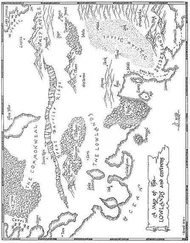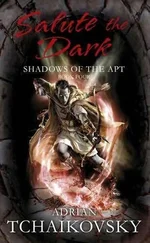Adrian Tchaikovsky - Heirs of the Blade
Здесь есть возможность читать онлайн «Adrian Tchaikovsky - Heirs of the Blade» весь текст электронной книги совершенно бесплатно (целиком полную версию без сокращений). В некоторых случаях можно слушать аудио, скачать через торрент в формате fb2 и присутствует краткое содержание. Жанр: Фэнтези, на английском языке. Описание произведения, (предисловие) а так же отзывы посетителей доступны на портале библиотеки ЛибКат.
- Название:Heirs of the Blade
- Автор:
- Жанр:
- Год:неизвестен
- ISBN:нет данных
- Рейтинг книги:4 / 5. Голосов: 1
-
Избранное:Добавить в избранное
- Отзывы:
-
Ваша оценка:
- 80
- 1
- 2
- 3
- 4
- 5
Heirs of the Blade: краткое содержание, описание и аннотация
Предлагаем к чтению аннотацию, описание, краткое содержание или предисловие (зависит от того, что написал сам автор книги «Heirs of the Blade»). Если вы не нашли необходимую информацию о книге — напишите в комментариях, мы постараемся отыскать её.
Heirs of the Blade — читать онлайн бесплатно полную книгу (весь текст) целиком
Ниже представлен текст книги, разбитый по страницам. Система сохранения места последней прочитанной страницы, позволяет с удобством читать онлайн бесплатно книгу «Heirs of the Blade», без необходимости каждый раз заново искать на чём Вы остановились. Поставьте закладку, и сможете в любой момент перейти на страницу, на которой закончили чтение.
Интервал:
Закладка:
‘If he’s going back there.’ The ship’s master shrugged. ‘If he thinks it’s worth the candle.’
They waited a day before the marsh people came to investigate the fires, unconcerned by the crossbows the three mariners lifted against them. They were slight Mantis-kinden with grey-green skins, silent and staring, but the master offered them some token that looked just like a red stone to Praeda. They accepted it from her, in the manner of a contract concluded, and vanished into the thronging green again.
‘Now we’re running out of time,’ the master had declared. ‘Half a day more and we’ll have to catch the tide, so come along with us, or stay on your own.’
‘And your friend?’ Praeda asked her, but the woman shook her head, lips pressed together.
The friend never showed, and the master abandoned her hopes brusquely, as though it was nothing of any particular import. Nobody mentioned the Empire, even though it was the prime culprit in the man’s absence. Only as the little ship cast off, turning back for Porta Rabi, did Praeda see the Solarnese woman’s shoulders slump and her ramrod posture collapse. Their last view of the woman, as her vessel tacked swiftly away, might have been of her weeping.
‘Well,’ Praeda said soberly. ‘We’re on your ground, so what now?’
Amnon considered slowly. ‘We cannot travel the marshes, not so far from the city. The shipmaster’s token will be no good to us now. We must reach the desert and then take the long road to the Jamail.’
‘But surely the marsh-kinden will know you – you were First Soldier. They’re hardly going to sell you to the Ministers or the Empire, are they? Can’t they help us?’
His smile was fond. ‘Your people have such a belief that other kinden are just like you beneath the surface. Your logic is like bad wine, Praeda: it does not travel. You know a little of our histories?’
‘I know what you tell yourselves about your histories, but I don’t accept it as the truth. History never is,’ she replied defensively.
‘Then just this: the marsh people are pacted to us – rather, to Khanaphes.’ That self-correction was hasty and awkward. ‘Sworn to send their people to serve us, but in return we leave them their ancient ways. Stray from the river, stray into the delta, and you enter their domain and they will hunt you. They are very skilled in the hunt.’
They followed the borderlands of the marsh, where the ground was still damp but firm enough to walk on, where the riot of ferns and cycads and arthrophytes gave way to long, lush grass and thornbushes. A day and a half of muggy heat it took them, resting up beneath what shelter they could find during the hottest hours, pressing on after dark to make up the time. They encountered the marsh-kinden just once, when they had camped past midnight in a stand of cypress trees. The Mantis-kinden came padding up, five of them, to investigate Amnon’s fire, but they seemed to recognize that they were beyond their boundaries. Instead, they regarded the travellers solemnly, until Amnon offered them some of the fish he was cooking. Hesitantly they came forward, three women and two men, slight enough almost to be children. Those of their kin that Praeda had seen in Khanaphes went about as shaven-headed as the locals, but these had white hair, worn long and braided back, then twined and knotted in intricate patterns.
One of them reached out to touch Amnon’s stubbled scalp. The rest kept stealing glances at Praeda’s own head of long, dark hair. Such a small thing, but so important here. Shaving the head signified submission to the will of the mythical Masters of Khanaphes, the invisible lords of the city in whose ghostly name the Ministers governed. Praeda’s professional academic opinion was that they were long extinct, merely a convenient rod with which to keep the people of the city in line.
Amnon spoke with the marsh-kinden, trying to coax some news from them, but they would admit to no knowledge of recent developments within the city itself. If the pickings of their hunts had been richer, with refugees fleeing from the Empire’s advance falling into their hands, they made no mention of it.
How did the fight go? Praeda wondered. The magnificent army of the Khanaphir had been devastated by a Scorpion-kinden host armed only with obsolete Imperial cast-offs. How would they have coped when the Empire itself stood before their gates, rather than merely by proxy?
Towards the end of the next day the two of them had put the huge swathe of the delta behind them, and could now see the farmland lining the Jamail extending northwards along the river’s course. Khanaphes itself appeared brilliant in the sunlight, its stones fairly glowing. Praeda could make out those walls that had served it so poorly in the fighting, and beyond them the greater edifices of the city government. Nothing seemed to be on fire or even smouldering.
‘They’ll have guards on the gates,’ she said, recalling all she knew of the Empire. ‘They’ll be searching all the people coming in and going out. Anyone slightly suspicious will get thrown behind bars, interrogated, fined, made to disappear. In fact, a fair few people who aren’t suspicious, too, just to spread fear. Fear keeps people in line, especially the fear of arbitrary punishment. Nobody wants to be noticed, when that kind of regime’s in place. Nobody causes trouble when they don’t know for sure where the lines are drawn. So no doubt there’s some secret back way into the city, that only the First Soldiers know about?’
Amnon regarded her quizzically. ‘Why would anyone devise such a thing?’
‘But you have a plan,’ Praeda insisted. ‘If we just walk in, well
…’ She swallowed, tilted her chin up. ‘I’ll shave my head. Then we’ll be locals. Will that be enough?’
‘Perhaps. As you say, I have a plan.’
Before dusk they had trekked through a mile of farmland, tracing an erratic path of roads and irrigation dykes to reach one specific farmhouse out of dozens. There were a few Khanaphir about, who watched them arrive, more of caution in their eyes than curiosity. At the door, a broad-shouldered old man met them, nodding at Amnon as though he was a tax collector.
‘I’d expected it,’ was all he said, and he plainly recognized the former First Soldier. ‘Inside, then, you might as well. Food?’
‘If you have spare,’ Amnon said with careful deference. He had to stoop some way to get under the lintel, Praeda trailing after him.
Most of the house consisted of a single room, where a long table had already been set. A woman of the old man’s years was bustling about it now, rearranging the places to find space for two more. She glanced from Amnon to Praeda, her dark eyes unreadable. Praeda realized that she herself had never seen a peasant home belonging to the Khanaphir, what with living out of an embassy and being the honoured guest of the Ministers. She had assumed that the foundation on which Khanaphir rested must be crushed down by its weight, impoverished and sullen – deprived as they were of anything like Collegium’s enlightenment and standard of living. Instead, the inside of the farmhouse was surprisingly well furnished, chairs and table all finely carved and clearly ancient, and the walls liberally adorned with those baffling carvings. Even these Khanaphir peasants lived neck-deep in history, she saw, and they bore their servitude with stubborn pride.
The Beetle-kinden they had seen outside now trooped in to take their places, and Praeda found that she and Amnon were directed towards the table’s head, sitting at the right hand of the old man. She guessed that it was the senior pair that owned and ran the farm, and the rest were hirelings and farmhands. The fare itself consisted of some kind of thick soup, flat bread, and some fish that had been pickled to within an inch of its life at some point in its distant past.
Читать дальшеИнтервал:
Закладка:
Похожие книги на «Heirs of the Blade»
Представляем Вашему вниманию похожие книги на «Heirs of the Blade» списком для выбора. Мы отобрали схожую по названию и смыслу литературу в надежде предоставить читателям больше вариантов отыскать новые, интересные, ещё непрочитанные произведения.
Обсуждение, отзывы о книге «Heirs of the Blade» и просто собственные мнения читателей. Оставьте ваши комментарии, напишите, что Вы думаете о произведении, его смысле или главных героях. Укажите что конкретно понравилось, а что нет, и почему Вы так считаете.












